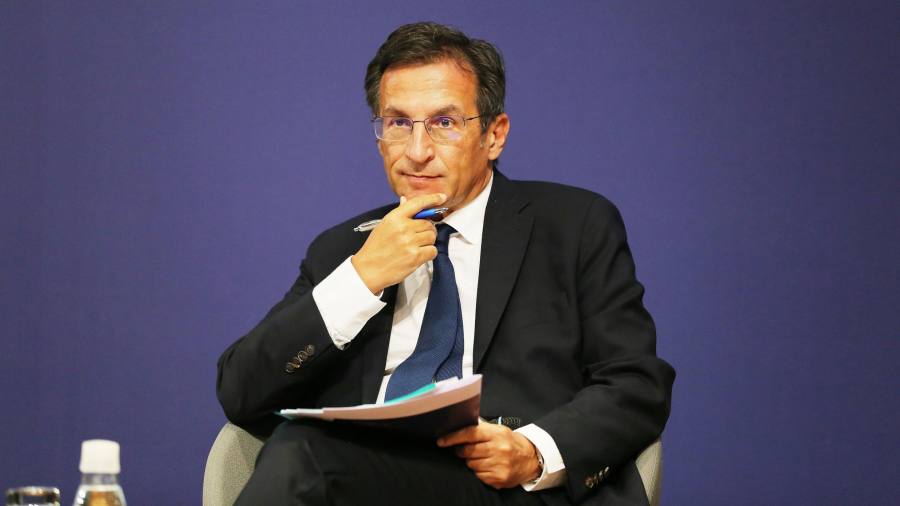Receive free Tech start-ups updates
We’ll send you a myFT Daily Digest email rounding up the latest Tech start-ups news every morning.
The writer is founder of Sifted, an FT-backed site about European start-ups
Call it the problem of the missing zero. That, at least, is how the French financier Philippe Tibi defines the scale of Europe’s challenge when it comes to defending the region’s technological sovereignty.
As the US and China pump huge sums of money into their tech sectors, Europe is in danger of stumbling in the global geotechnological race. “In Europe there is a gradual understanding that the order of magnitude for everything is lacking a zero,” Tibi tells me in a video interview. “You do not talk about hundreds of millions, but billions, when it comes to investing in batteries or semiconductors.”
Rather than just analysing the challenge, Tibi is attempting to rise to it. His aim is to mobilise growth capital across Europe and add that extra zero to investment rounds in critical industries. In 2019, with the backing of the French government, he helped persuade 23 of France’s leading institutional investors to commit €6bn of late-stage funding over three years to the tech sector. He offered no carrots or sticks but appealed to the investment community’s self-interest. The government later set a target of mobilising €30bn including additional third-party investors.
Enthusiasm for the scheme has been such that Tibi 2 has just been launched, aiming to attract a further €7bn of institutional money into the tech sector over the next four years, focusing more on early stage, deeptech and cleantech investments. “Our aspiration is to have 10 VC funds managing €1bn,” he says. Currently, there are three.
The Tibi initiative has attracted attention across Europe, particularly in the UK, which also suffers from a shortage of growth capital. In its recent Start-Up, Scale-Up report, Britain’s opposition Labour party stated it wanted to copy the Tibi initiative. In his Mansion House speech on Monday, the UK chancellor Jeremy Hunt may jump in first. He is expected to announce measures encouraging pension funds to allocate more money to scale-up capital. The BVCA industry association reports that overseas pension funds currently invest 16 times more than their British counterparts in UK venture capital and private equity funds.
One thing that Europe is not lacking is capital. What is absent is intent. According to the European Fund and Asset Management Association, total assets under management in the region amounted to a colossal €28.4tn in the third quarter of 2022. The trouble is only a tiny fraction of that total is allocated to growth capital. When it comes to institutional investment, Europe remains mostly a region of risk-averse rentiers.
There are reasons for this reluctance to invest in growth capital. Private market investments tend to be riskier, less liquid and have longer payback periods. It is also difficult to deploy sufficient capital to make a difference to overall portfolio performance. Many fund managers also lack the expertise to assess emerging tech trends or pick between relatively unproven European VC funds. The absence of a tech-friendly, pan-European stock market, allowing investors to cash out, also limits the sector’s appeal. Often, it is safer, easier and cheaper to buy publicly traded companies on New York’s Nasdaq market if a fund manager wants exposure to tech.
Even so, Tibi 1 created something of a “snowball effect” among French fund managers, according to William Barrett, managing partner of Reach Capital, an advisory fundraising firm. The initial Tibi initiative attracted a lot of first-time investors into the late-stage tech sector. But the tech downturn of 2021, in which private market valuations fell heavily, has resulted in VC funds writing down many investments made this decade. “The institutional funds want additional exposure. But to make the case right now if you are only seeing what happened to the 2020s vintages is very difficult,” Barrett says.
Over the past decade, Europe has developed a vibrant early stage start-up ecosystem. The arrival of top US VC funds, such as Sequoia Capital, Bessemer Venture Partners, Lightspeed and now Andreessen Horowitz, speaks to a growing global interest in Europe. “The opportunity set in Europe has massively grown. And valuations are more attractive in Europe than in the US,” says Nathalie Kornhoff-Brüls, managing director of Eurazeo’s growth team. “That should give a big incentive to these European pools of capital to invest.”
It is absurd that foreign investors are more active backers of Europe’s technological future than the region’s own fund managers. It is time for European institutions to commit.
Read the full article here





